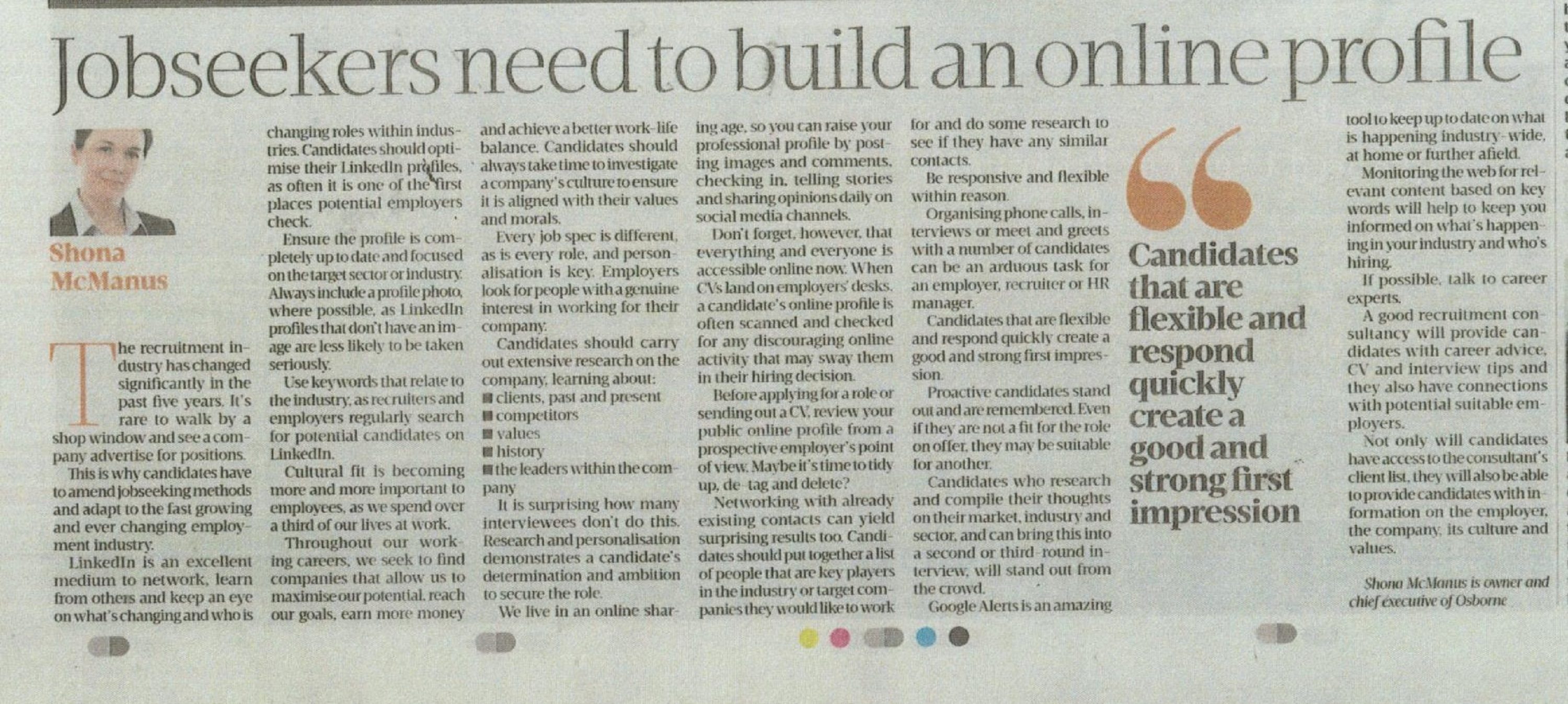Osborne Article in Sunday Business Post – August 2016
17 June 2025
The Sunday Business Post printed another article by Osborne CEO Shona McManus on 28th August 2016.

Article: The recruitment industry has changed significantly in the past five years. It’s rare to walk by a shop window and see a company advertise for positions. This is why candidates have to amend jobseeking methods and adapt to the fast growing and ever changing employment industry.
LinkedIn is an excellent medium to network, learn from others and keep an eye on what’s changing and who is changing roles within industries. Candidates should optimise their LinkedIn profiles, as often it is one of the first places potential employers check. Ensure the profile is completely up to date and focused on the target sector or industry. Always include a profile photo where possible, as LinkedIn profiles that don’t have an image are less likely to be taken seriously. Use keywords that relate to the industry, as recruiters and employers regularly search for potential candidates on LinkedIn.
Cultural fit is becoming more and more important to employees as we spend over a third of our lives at work. Throughout our working careers we seek to find companies that allow us to maximise our potential, reach our goals, earn more money and achieve a better work-life balance. Candidates should always take time to investigate a company’s culture to ensure it is aligned with their values and morals.
Every job spec is different as is every role, and personalisation is key. Employers look for people with a genuine interest in working for their company. Candidates should carry out extensive research on the company, learning about their clients (past & present), competitors, values, history and the leaders within the company. It is surprising how many interviewees do not do this. Research and personalisation demonstrates a candidate’s determination and ambition to secure the role.
We live in an online sharing age, so you can raise your professional profile by posting images and comments, checking in, telling stories and sharing opinions daily on social media channels.
Don’t forget, however, that everything and everyone is accessible online now. When CVs land on employers’ desks, a candidate’s online profile is often scanned and checked for any discouraging online activity that may sway them in their hiring decision. Before applying for a role or sending out a CV, review your public online profile from a prospective employer’s point of view. Maybe it’s time to tidy up, de-tag and delete?
Networking with already existing contacts can yield surprising results too. Candidates should put together a list of people that are key players in the industry or target companies they would like to work for and do some research to see if they have any similar contacts.
Be responsive and flexible within reason. Organising phone calls, interviews or meet and greets with a number of candidates can be an arduous task for an employer, recruiter or HR Manager. Candidates that are flexible and respond quickly create a good and strong first impression. Proactive candidates stand out and are remembered. Even if they are not a fit for the role on offer, they may be suitable for another.
Candidates who research and compile their thoughts on their market, industry and sector, and can bring this into a second or third-round interview, will stand out from the crowd. Google alerts is an amazing tool to keep up to date on what is happening industry-wide, at home or further afield. Monitoring the web for relevant content based on keywords will help to keep you informed on what’s happening in your industry and who’s hiring.
If possible, talk to career experts. A good recruitment consultant will provide candidates with career advice, CV and interview tips and they also have connections with potential suitable employers. Not only will candidates have access to the consultant’s client list, they will also be able to provide candidates with information on the employer, the company, its culture and values.



